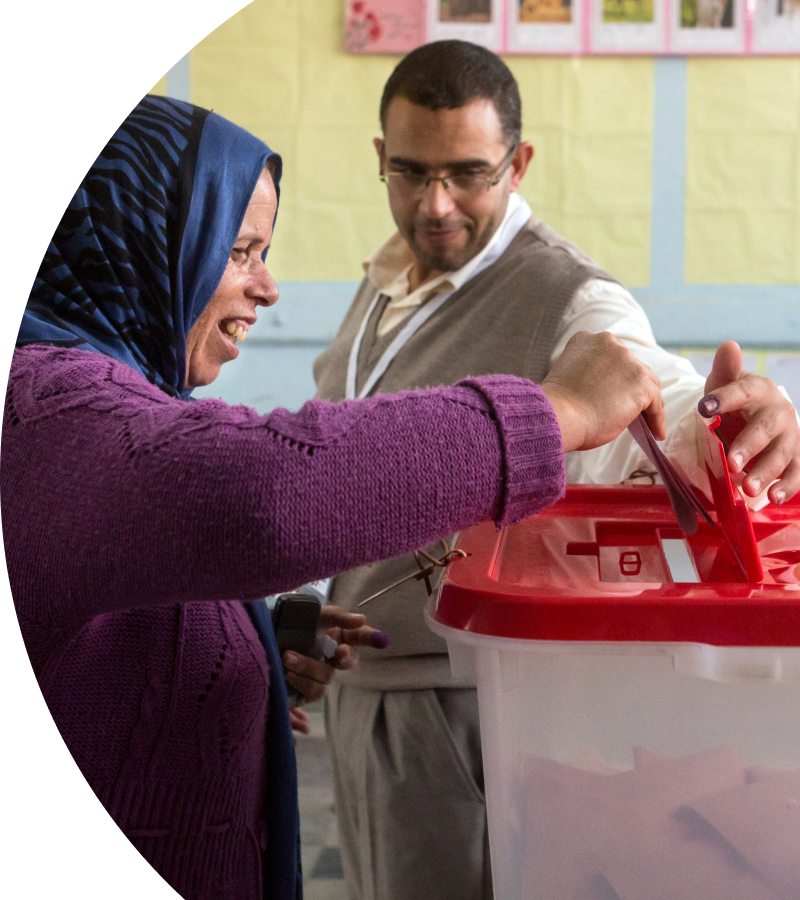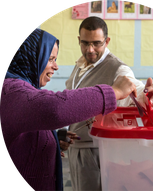



Peace
Programs
Peace
Programs


A voter deposits her ballot during elections in Tunisia. The Carter Center has observed six elections in the country, beginning in 2011.

Democracy Program
The Carter Center observed elections in 2023 in Tunisia, Sierra Leone, Zimbabwe, and the Democratic Republic of the Congo (DRC) and sent an expert mission to Liberia. The Center also supported citizen observation efforts in DRC, Liberia, Zimbabwe, and Sudan. Building on work aimed at advancing the participation of women and youth in Zambia, the Center hosted an inclusive democracy event in Lusaka to foster collaboration. At the event, the Center released a new edition of its Election Obligations and Standards manual, which provides a framework for assessing the democratic nature of elections, based on international standards rooted in human rights. The Center announced a partnership to promote transparent and trustworthy electoral processes in the U.S. The alliance aims to strengthen the core values of democracy and electoral integrity as defined in the Candidate Principles for Trusted Elections, a national, cross-partisan effort co-led by The Carter Center and the Gerald R. Ford Presidential Foundation and supported by over 70 organizations across the country.
An election worker in Sierra Leone staffs a voting station.
A Dubious Election in Sierra Leone
The Center has played a role in all of Sierra Leone’s elections since 2002, when the country emerged from civil war. In June of last year, the Center returned to observe elections, but, unfortunately, transparency problems cast doubt on the credibility of the results.
On election day, Carter Center observers were able to watch voting at 119 polling stations in every district of the country. Voters waited patiently in long lines, and observers later monitored the slow but properly executed counting process. Carter Center representatives were the only observers present at the tabulation center in the capital, Freetown, where they saw Election Commission staff tampering with ballot boxes. “It’s highly unusual for The Carter Center to be eyewitness to such a serious infraction,” said the Center’s Nicholas Jahr.
As the tabulation process continued and irregularities mounted, the Center issued a series of statements calling for greater transparency and urging voters to remain patient while awaiting results. Ultimately, the ruling party candidate was declared the winner, but The Carter Center questions whether the will of the people was realized.

Conflict Resolution Program
Following U.N. peacekeeping forces’ withdrawal, the Center completed its role as the Independent Observer of Mali’s peace agreement. The Peace Through Health initiative made significant strides in central Mali, implementing health initiatives and a mental health and psychosocial project that actively contributed to peacebuilding efforts. Despite a new war in Sudan, the Center continued the Youth Citizen Observer Network, which represents 7,000 youth groups and plays a key role for Sudanese and peace negotiators by serving as an educator, representative, and watchdog. In Israel-Palestine, the Center is supporting solutions to the crisis that began Oct. 7 and engaging youth on advocacy projects. In Syria, The Carter Center is marrying research and analysis with support to negotiations to foster political consensus on crucial issues such as using an innovative approach to map unexploded ordnance to inform solutions acceptable to all stakeholders. Stateside, the Center’s Democracy Resilience Networks in Arizona, Florida, Georgia, Michigan, North Carolina, and Wisconsin are expanding. Network members are facilitating cross-partisan events to combat community polarization and political violence.

Human Rights Program
The Carter Center continues to promote equal rights for all amid an overall erosion of human rights. In 2023, the Center advanced the rights of protected groups, especially frontline women environmental activists, by supporting indigenous women in attending well-being seminars and participating in COP28, a U.N. climate change conference. In the United States, the Center partnered with Black-owned businesses and historically Black colleges and universities (HBCUs) to address historical racial inequality and promote human rights. The Center worked alongside the U.N. Office for Human Rights to lay a foundation of domestic human rights principles. Globally, the Center continued to pursue a “just transition” in the Democratic Republic of the Congo by advocating for reform in the oil, gas, and minerals industries. The Human Rights House in Kinshasa provided small grants to women’s groups working to address threats to women’s rights. The Center’s Israel-Palestine team is funding grassroots human rights organizations in both Israel and Palestine to continue their essential work. The India Policy Initiative engaged with U.S. policymakers on critical domestic developments in India.
Taking Action Against Extreme Weather
For farmer Dominic Hamanyanga, climate change is no political buzzword. He has seen its toll firsthand in his southern Zambia community of Gwembe.
“Climate change has affected our farming because of droughts, and sometimes there’s flooding,” he said. “When there’s no rain, there is usually very high heat, and because of that all crops die out, and as a result you don’t have a harvest.”
In between droughts, torrential rains wash away grasses, so there’s not enough food for people or livestock. Roads and bridges are ruined, disrupting school and commerce.
In the first project of its kind, The Carter Center is working with communities in Zambia to address drought, deforestation, and other aspects of climate change.
Community members are embracing the value of preserving forested land and planting new trees to replace ones that have been cut down for charcoal production. They are planting thousands of fruit trees that can help feed their families while stabilizing soil, providing shade, and absorbing carbon dioxide.
The initiative has been effective. A local advocacy committee in Gwembe won a Zambian Governance Foundation grant to continue fighting climate change.

With assistance from The Carter Center, farmer Dominic Hamanyanga and members of his community are planting fruit trees and embracing forested land to combat drought and high heat.

Rule of Law Program
In anticipation of the 2024 U.S. presidential campaign, The Carter Center encouraged members of the legal community to use their skills to strengthen U.S. democracy and the rule of law. Further expanding its work in the United States, the Center partnered with the Atlanta Policing Alternatives and Diversion Initiative to ensure that people in Georgia experiencing a mental health crisis or substance use disorder receive appropriate and effective treatment and support versus incarceration. The Center is also expanding its Advancing Women’s Right to Information initiative to six more districts in Bangladesh. In Costa Rica, The Carter Center assisted the Ministry of Public Security in developing a suite of tools to advance gender equality and equity in the police forces. After more than 15 years of advancing women’s right to information, access to justice, and security sector accountability, the Center successfully concluded and transitioned its rule of law programming in Liberia to local government and civil society partners.

China Focus
A new installment in the Carter Center’s Finding Firmer Ground report series, released in February 2023, examined how technological advancements have increased distrust and uncertainty in U.S.-China relations. The Center also partnered with the 21st Century China Center at the University of California-San Diego to convene the eighth Carter Center Young Scholars Forum on U.S.-China Relations. The Carter Center continues to publish the U.S.-China Perception Monitor website (www.uscnpm.org), creating and curating up-to-date content on developments between the two superpowers.
Regina N. Bee helped community members file requests for government information during her tenure as a youth information ambassador.
Mission: Ask Questions
When Regina N. Bee, a Carter Center youth information ambassador in Bong County, Liberia, told students at her local school that the country’s freedom of information law gave them the right to ask their principal about the status of their ID cards, the principal accused her of
brainwashing them.
But instead of taking it personally, Bee was reassured that her work in educating youth about freedom of information was making an impact.
Bee was one of 16 students in a pilot program in Liberia, where the Center has been working on freedom of information issues since 2010.
“For me, this program brings about openness and makes people accountable to citizens,” Bee said.
For students, ID cards are required for reduced bus fare and admittance into programs. According to Bee, it took weeks for the principal to provide information about the cards after students made their request.
During the project, the youth ambassadors, along with the Center’s freedom of information facilitator, helped their peers and women in the community file 293 freedom of information requests with various government institutions and other organizations receiving public funds. The institutions responded to 105 of those requests.









